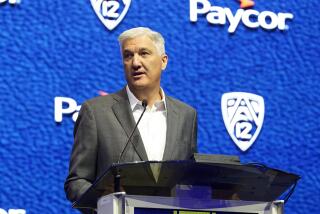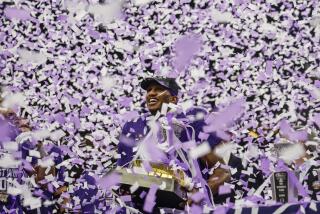Another disappointing year for the Pac-12 weighs on Commissioner Larry Scott
- Share via
Everyone knows this has been a historically bad year for the Pac-12 Conference.
Its football teams stumbled to a 1-8 record in bowl games this winter. In men’s basketball, only three schools made the NCAA tournament and none advanced past the first round.
But those aren’t the only numbers that have detractors calling for commissioner Larry Scott to resign.
With the Pac-12 Networks still struggling to lure subscribers, the conference has lagged significantly behind the likes of the Southeastern and Big Ten conferences in terms of revenue.
There is a direct connection to on-the-field performance — smaller payouts mean less money to sign the coaches and build the facilities that lure top recruits.
“It was definitely a down year,” Scott said. But, he added, “I still see an underlying strength.”
In a series of interviews, Scott acknowledged some missteps while expressing confidence in the face of criticism that has come his way as he enters his ninth year on the job.
Setting aside UCLA’s embarrassing incident in China and the fact that two Pac-12 assistants have been implicated in the recent college basketball scandal, Friday night football became an issue last fall with conference leaders USC and Washington suffering crucial losses while playing on the road after a short week off.
The conference has vowed there will be no more back-to-back road trips for teams facing a Friday night game.
“I don’t think anyone expected the type of correlation we saw,” Scott said. “If people had seen it as unfair, it would have been changed earlier.”
Complaints about late kickoff times have grown louder, both among fans and coaches such as Washington’s Chris Petersen, who complained that no one on the East Coast stays up past midnight to watch Pac-12 games.
But Pac-12 scheduling has been dictated by a 12-year, $3-billion TV deal the conference signed in 2011. Ratings suggest that Friday nights and late starts can outdraw Saturday afternoons, when viewers have a variety of choices.
“ESPN and Fox said to us point-blank, if you want the kind of money the SEC and Big Ten are getting … we can’t give it to you if you’re playing at the same time as those schools,” Scott said. “We’ve tried to go back and renegotiate, but they say, ‘Hey, this is what we bargained for. You wanted more money and we wanted more night games.’”
The Pac-12 Networks present a different sort of problem.
With the onset of channels dedicated to specific conferences, the Pac-12’s biggest rivals partnered with established broadcasters and have seen immediate returns. Scott convinced his member schools to launch their own network.
The five-year-old venture has struggled to build viewership, in part because it still has not reached a deal with DirecTV. As a result, SEC and Big Ten schools receive a reported $8 million annually in broadcast fees while Pac-12 schools get about a third of that.
The difference helps explain why the Pac-12 ranks down the list of Power Five conferences in overall revenue distribution, with payouts of about $30 million as compared to the $40 million-plus that SEC schools receive, according to the most-recent tax returns available.
Scott, who earns a reported $4 million a year, insists money was never the sole factor when deciding how to proceed with the network.
As a conference that calls itself a home for Olympic sports, he says, the Pac-12 sought to ensure the likes of women’s gymnastics and men’s volleyball get airtime.
“We have 850 events each season and 650 of them are sports other than football and men’s basketball,” Scott said. “If your only objective was money, you wouldn’t put them on the air because they cost a lot to produce and the financial return on investment doesn’t make sense.”
Some administrators in the conference, such as Washington State president Kirk Schulz, have begun to express doubt, suggesting that priorities can change.
“I would never say that you wouldn’t make a different call at some point,” Scott said. “But at this point there’s been a real conviction by our universities and myself that the original purposes of having a Pac-12 network are important.”
Perhaps the best hope for growth rests with emerging platforms such as Amazon and Facebook, which have shown increasing interest in live sports.
“The game is coming to us. There are going to be a lot more options,” Scott said.
The changing media landscape won’t help for a while because the ESPN and Fox deals don’t expire until the 2023-24 season.
For now, it seems, Scott must persuade his critics to remain patient.
“You’re always juggling a lot of competing priorities to find the right balance,” he said. “It’s rare that you get it perfectly right, but you do your best.”
Follow @LAtimesWharton on Twitter
More to Read
Go beyond the scoreboard
Get the latest on L.A.'s teams in the daily Sports Report newsletter.
You may occasionally receive promotional content from the Los Angeles Times.











